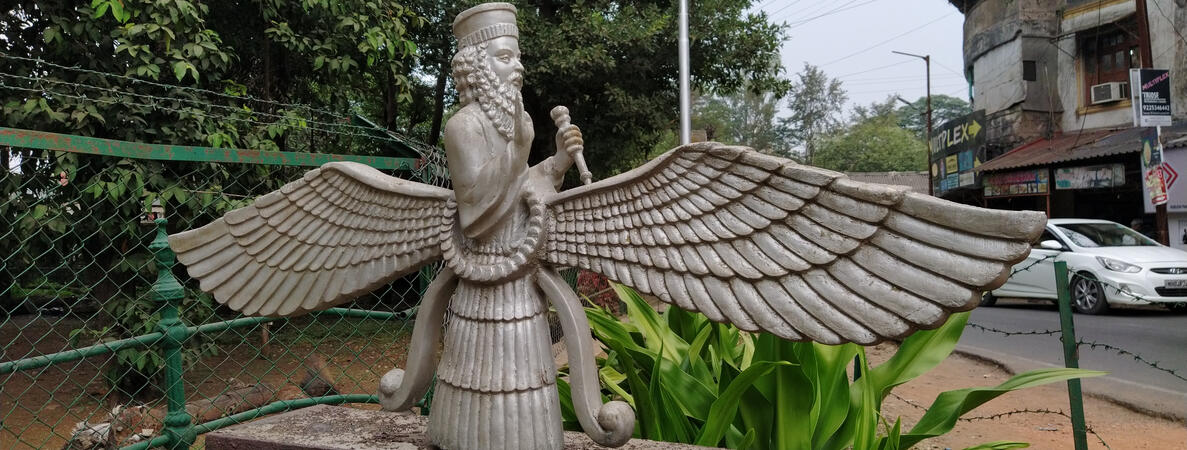In addition to this sampling, you can also view our full YouTube playlist of Zoroastrianism and Ecology videos here.
Multimedia
Ecology in Zoroastrianism presented by Ervad Tehemton Mirza at the NAMC AGM hosted by Zoroastrian Association of Houston June 2023.
FEZANA participated at the 66th Commission on the Status of Women (CSW) Conference at the UN Headquarters in New York, USA. The CSW66 priority theme this year was: “Achieving gender equality and the empowerment of all women and girls in the context of climate change, environmental and disaster risk reduction policies and programs.” Carina Daruwala, Maya Joshi, Feroza Jussawalla, Afreed Mistry, Behram Pastakia and Anahita Verahrami from FEZANA represented the Zoroastrians at the UN.
Join us for our first 2022 FEZANA Talks Session, which will highlight the way in which Zoroastrianism, perhaps uniquely among the religions of the world, has placed man in harmony with nature through the doctrine of the Amesha Spentas. We will also be going over what Zoroastrians today think about environmental issues according to the landmark global survey, Gen Z and Beyond, which although in its early stages is already producing interesting results. Speakers: Dr Sarah Stewart, the SOAS Shahpoorji Pallonji Lectureship in Zoroastrianism and co-chair of the SSP Institute of Zoroastrian Studies; Moderator: Moderator Shernaz Engineer is a Fellow of the Institute of Recruitment Consultants and owns and runs Verity Appointments which places commercial and office staff and City Education which places supply teachers to schools. Shernaz is Chair of the Zoroastrian Chamber of Commerce- UK Chapter which encourages entrepreneurship within the Zoroastrian Community.
The Zoroastrians revere water and all creations. Our traditional philosophy and practices of water conservation regain significance in a world facing acute water shortage. Our collective hopes lie in our ability to understand their continuities in contemporary practice. In the Ava Project, we have curated resources that take us closer to the synergy between reverence to nature, ecology, and human action. We invite you to participate in our endeavor to give social, cultural, and technical attention to Zoroastrian philosophy and practices of sustainability and water conservation. Featuring: Prof. Kavas Kapadia, Dr. Karishma Koka, Mahtab Dastur, Vanshika Singh, Vispi Kasad, Afreed Mistry, Delzin Choksy with Dr. Shernaz Cama.
Yazad C. Unwalla of the Zoroastrian Trust Funds of Europe and World Zoroastrian Organisation speaks about Zoroastrian festivals which celebrate the seasons, and how worship in this faith also involves elements of nature and their observance of keeping the earth in good order through agricultural practices.
Tehemton Mirza, Vice President of the North American Mobeds Council, gives a presentation on how religions, particularly Zoroastrianism, can respond to the ecological crisis. He claims that there are religious answers found in Zoroastrian scriptures, practices, and beliefs that can be for the benefit of humankind. After his talk, Mirza answers questions from the audience.
Dr. Soroosh Sorooshian, Professor of Civil and Environmental Engineering and Earth System Science at University of California, Irvine, presents an overview of the four elements that Prophet Zoroaster instructed humans to protect as they relate to the scientific elements of the earth. He then talks about climate change and introduces a variety of problems related to water and their engineered solutions. The webinar is given in both English and Farsi and is followed by a brief time for questions and answers.
This video is part of the FEZANA Talks series, in which the Zoroastrian community engages with diverse issues across the diaspora. It particularly highlights conversations from the World Zoroastrian Youth Conference in 2019, as four young Zoroastrians discuss the ways in which the COVID-19 pandemic and climate change interact. Their talks are followed by an open discussion with the listeners.
Panelists Hanoz Santoke, Farzad Sunavala, and Reanna Unwalla give a thirty minute presentation on how Zoroastrian values relate to what their generation can and should do to address climate change. Drawing on values such as purity and good deeds and Zoroastrian sacred texts such as the creation story, the panelists provide the audience with religious resources and practical ways they can live more sustainably. This panel is followed by a free-flowing discussion with the audience.
Not Just Milk & Sugar is an accessible inquiry into the Zoroastrian faith, its basic teachings, uniqueness, and myths. Through a bedtime story told by a grandfather to his grandson, the relevance of this ancient faith in today's modern world unfolds as a simple and beautiful ecological message.
In Zoroastrian culture, water is life. This video explains two water collection systems that Zoroastrians have been practicing for hundreds of years: Qanat, which are underground irrigation systems, and Tanka, which are rainwater collection and filtration systems. The speakers emphasize that ancient wisdom can be used as a response to the water crisis in India today.
In this movie on Asha, or the divine order of creation, the Bronze Age rituals of Yasna and the Jashan ceremony are enacted and their environmental significance explained.
This multimedia slideshow centers on how water is understood and used in Zoroastrian religious practices and in their culture in general. The exhibition shows the following ways that water is integrated into Zoroastrian life: the daily prayer ritual Yasna; Zoroastrian mythology; prayers to Ava, the guardian angel of water; water conservation systems; and material culture. Follow link to see full multimedia presentation.
Header photo: Faravahar, a symbol of Zoroastrianism in Mumbai, Maharastra/India; Shutterstock/Harshit Srivastava S3

